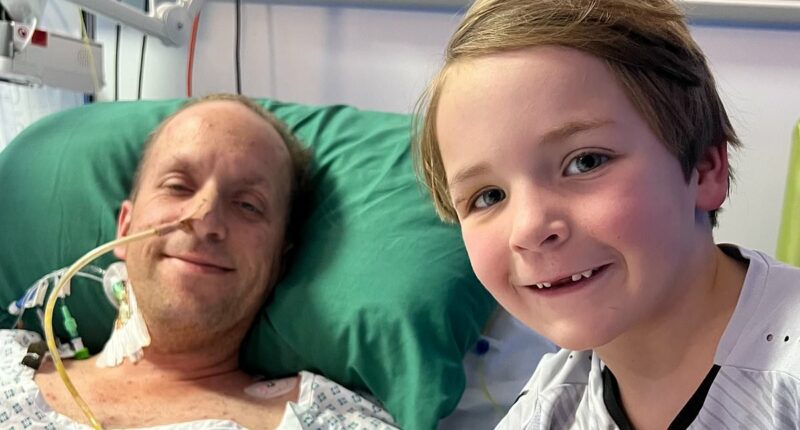Share this @internewscast.com
The first sign something was wrong for Matt Eamer came just days after a family barbeque, celebrating his son’s second birthday.
The then 39-year-old father-of-two from Redhill, Surrey, dismissed the sudden ‘spiky’ stomach pain as food poisoning.
‘I was speaking to work colleagues over the first week or two and thought I’d cooked a dodgy sausage,’ he said.
But his pain escalated quickly. After a rushed trip to A&E he was sent home with anti-nausea medication Buscopan, yet still felt dreadful.
His wife Sarah, 41, a doula, took him to East Surrey Hospital where scans revealed a ‘big blockage’ in his large intestine.
Surgeons removed two-thirds of his bowel in an emergency op. ‘A few days later they confirmed it was cancer,’ Matt said.
The diagnosis was stage four bowel cancer.
The disease had already spread to his liver and the lining of his abdomen, and further tests revealed a rare BRAF mutation which drives tumours to grow at speed.

The first sign something was wrong for Matt Eamer came just days after a family barbeque, celebrating his son’s second birthday

The 44-year-old father-of-two from Redhill, Surrey, dismissed the sudden ‘spiky’ stomach pain as food poisoning

The disease had already spread to his liver and the lining of his abdomen, and further tests revealed a rare BRAF mutation which drives tumours to grow at speed
‘I can still remember the person’s voice when she phoned and said, “the plan for your diagnosis has changed… we’re talking months not years from a survival point of view”,’ Matt recalled of the events in September 2020.
On his 40th birthday he was told standard chemotherapy had failed and surgeons found the cancer had advanced further.
‘It was a very dramatic, movie-like point,’ he said. ‘It was a pivotal change. They said, “we’ve gone in, it’s gone further, we’re going to try these new drugs.” My wife Sarah collapsed to the floor.’
Matt began fortnightly Cetuximab infusions combined with four daily Encorafenib pills, new immunotherapy drugs approved just months earlier.
Designed to buy only ‘three to six months’, they had a remarkable effect.
Within six months, scans showed no trace of cancer. Five years on, he is still clear and continues treatment.
‘Hitting five years with stage four is a rarity,’ he said. ‘You’re not on your death bed but you’re forced to think about how you spend your time.’
In December 2024, he underwent a 14-hour surgery to remove cancerous tissue in his ribcage, followed by heated HIPEC chemotherapy.

On his 40th birthday he was told standard chemotherapy had failed and surgeons found the cancer had advanced further

Surgeons removed two-thirds of his bowel in an emergency op. ‘A few days later they confirmed it was cancer ,’ Matt said

The disease had already spread to his liver and the lining of his abdomen, and further tests revealed a rare BRAF mutation which drives tumours to grow at speed
The disease had already spread to his liver and the lining of his abdomen, and further tests revealed a rare BRAF mutation which drives tumours to grow at speed.
Again, scans showed ‘things clear.’ Matt, who runs his own design agency, continues working and raising his two children.
‘The reality is younger people are able to deal with treatments better and live longer, better lives even if it is stage four,’ he said.
He adds: ‘The reality is the ‘bucket and spade things’, the little moments. I spend more time looking at my kids’ faces, taking them to a show or swimming in the sea — they are heightened.
‘It means your ability to be present and focus upon what matters is heightened.’
To mark five years since his diagnosis, Matt will join Sir Chris Hoy’s charity cycle in Glasgow on September 7, raising funds for Bowel Cancer UK.
‘It’s marking a milestone in a meaningful, positive way,’ he said.
Bowel cancer, also known as colorectal cancer, is one of the most common cancers in both Britain and the United States.
In the UK around 43,000 people are diagnosed every year, while in the US the figure is more than 150,000.
It is the third most common cancer worldwide and the second leading cause of cancer deaths.
In older age groups incidence is declining thanks to better screening and awareness, yet in younger people rates are rising sharply, a trend baffling doctors.
In England cases among those aged 25 to 49 have surged by around 3.6 per cent per year, one of the steepest increases in Europe, while in America rates in under-50s have been rising by about 2.4 per cent annually over the past decade.
Outcomes depend heavily on how early the disease is caught.
In the UK one-year survival is around 97 per cent if picked up through screening, but just 49 per cent if discovered in an emergency admission, as was the case for Matt.
In the US five-year survival is 92 per cent at stage one but only 13 per cent at stage four.
Most people with a diagnosis as advanced as Matt’s do not reach the five-year mark, making his story unusual.
Risk factors include family history, inflammatory bowel disease, obesity, alcohol, smoking, and diets low in fibre and high in red or processed meats.
Researchers are also examining the role of ultra-processed foods, though evidence remains inconclusive, and some studies point to gut bacteria toxins such as colibactin, found in food poisoning, as a possible trigger for early-onset cases.
Screening programmes remain vital. In the US guidelines now recommend testing from age 45, while in the UK stool tests are currently offered from 56, with pilot schemes lowering the age to 50.
Symptoms to watch for include persistent changes in bowel habits, blood in stools, unexplained weight loss, abdominal pain or bloating, and lumps in the abdomen.
Doctors stress that catching the disease early saves lives. Patients diagnosed at stage one are several times more likely to survive long term than those at stage four.
But as Matt’s case shows, advances in treatment—from new targeted drugs to more effective surgery—are beginning to change what is possible, even in the most serious cases.
For him, the experience has redefined life. ‘The reality isn’t bucket-list dolphins—it’s the bucket and spade things,’ he said.
















